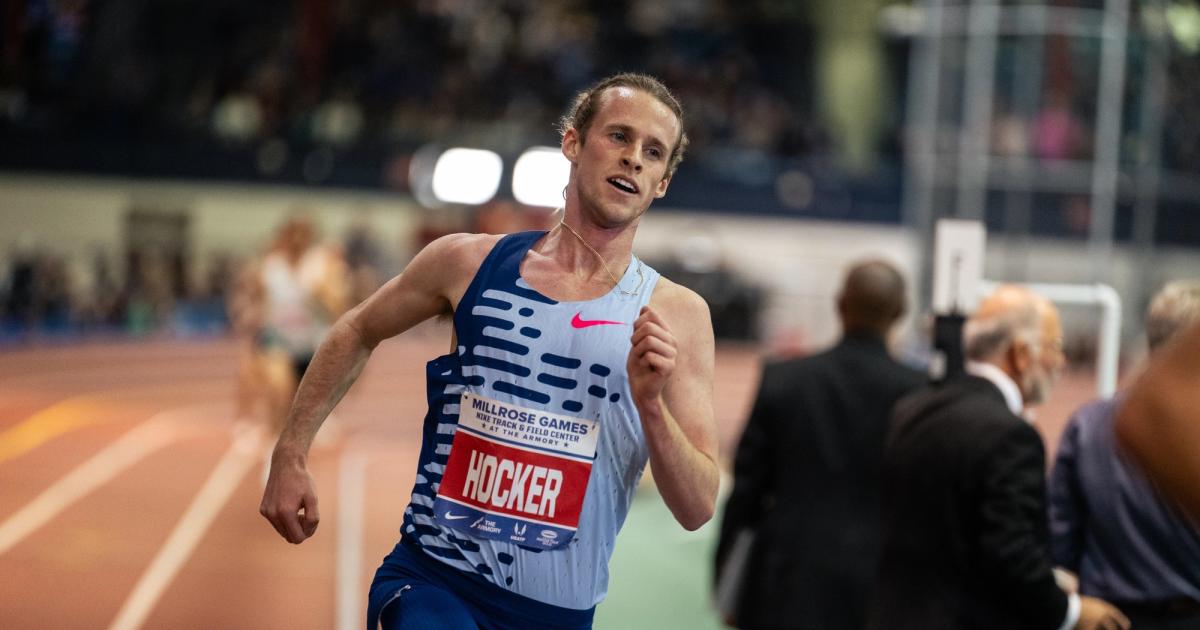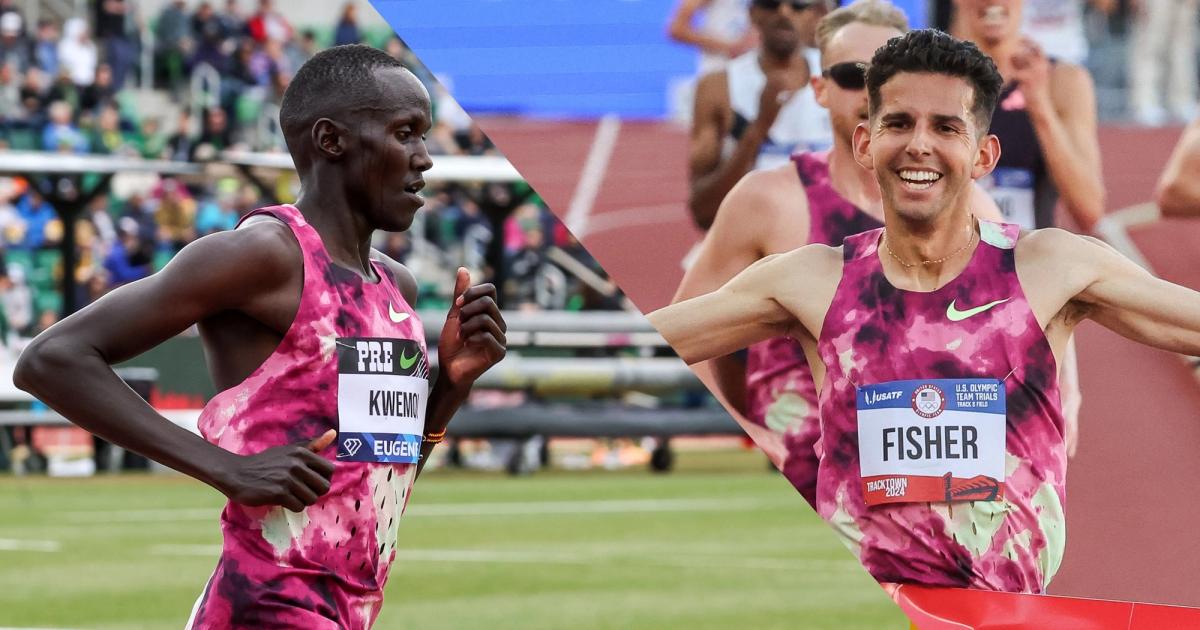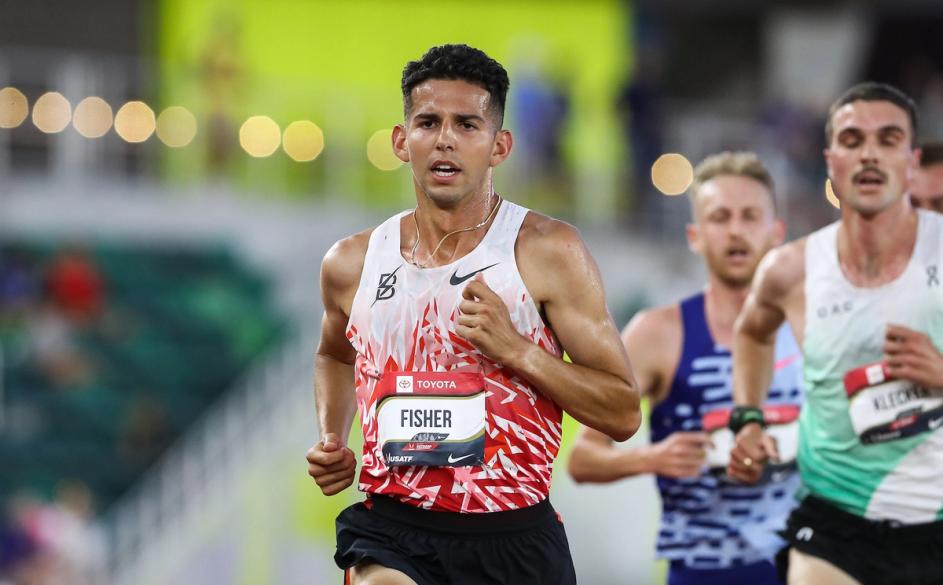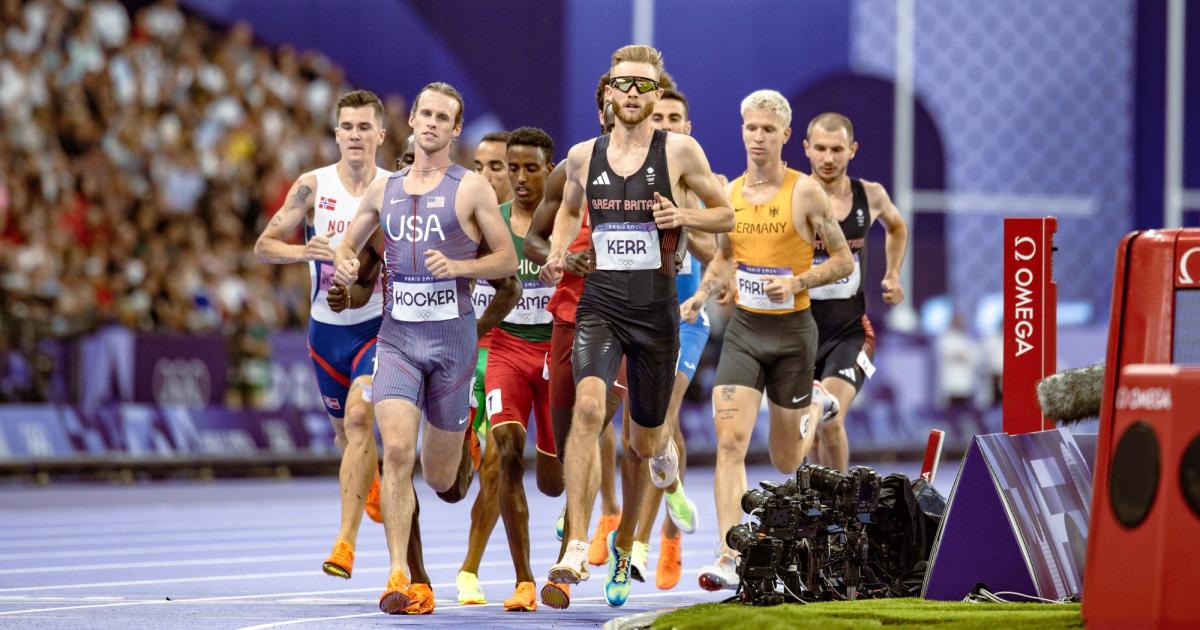By Chris Chavez
December 11, 2024
Last week, we announced 1500m Olympic champion Cole Hocker as one of the first athletes committed to the 2025 Millrose Games on Feb. 8th at The Armory in New York City. Race organizers have now confirmed 2024 Olympic 5000m and 10,000m bronze medalist Grant FIsher will also be in the field.
Fisher’s participation in Millrose was first shared by LetsRun.com.
Here’s what you need to know:
– The 2025 Millrose Games will be just the fourth career head-to-head race between Hocker and Fisher. All three races came in 2024 with Fisher winning all of them – the Millrose Games two-mile (8:03.62 to 8:05.70), the Los Angeles Grand Prix 5000m (12:53.30 to 12:58.82) and the U.S. Olympic Trials 5000m final (13:08.85 to 13:20.99). Fisher’s 8:03.62 for the two-mile at the Millrose Games is the American record. He came through 3000m in 7:30.14.
– The indoor 3000m U.S. record is 7:28.23 by Yared Nuguse in January 2023. This past weekend, UNC senior Ethan Strand ran the second-fastest U.S. indoor 3000m with his 7:30.15 collegiate record at the BU Sharon Colyear-Danville Opener. Fisher holds the U.S. outdoor record with his 7:25.47 from the 2023 Prefontaine Classic, where he chased Jakob Ingebrigtsen to the finish.
– The indoor 3000m world record is 7:23.81 by Ethiopia’s Lamecha Girma, set in Liévin, France in February 2023.
– Fisher and Hocker are both signed on as Racers with Grand Slam Track in 2025. Hocker is signed to the short distance group that will contest the 3000m and 5000m. Fisher is part of the long distance group that will race the 3000m and 5000m at each of the four Slams. In his episode of The CITIUS MAG Podcast, Hocker teased the idea of jumping up to the long distance group for one of the Slams.
We caught up with Grant Fisher at the Grand Slam Track Racer Summit in October. The following interview has been edited lightly for length and clarity.
Chris Chavez: Where are we with this Olympic hangover? Afterward, you attempted racing a couple of times on the Diamond League circuit. Then you were like, ‘Alright, actually, I'm tired. My body and my brain need a break.’ Now, where are we at?
I tried to race once and it went horribly. I felt absolutely awful, and my mind and body were just shut down. So I called it a season. I took a good month and a half off. I wouldn't even call it training—it was just off. I needed that reset mentally and emotionally. I was cooked. I took the time to come back, and now I'm building some volume again, adding structure, and getting back to workouts. Slowly, I'm getting back into it.
I was just speaking with Yared, and we're like, ‘Man, we've got 11 months until the World Championships,’ which is a pretty long time. So there's lots of hard training ahead.
You're at this point now where you can reflect on 2024. Was this year everything you could have asked for? Obviously there are two places better you could have gotten at the Olympics. But all in all, the changes you made leading into the season and the risks you took, everything seemed to have paid off and clicked.
Yeah, it all worked out almost as well as it could have in the end. Like you said, the only way it could have been better would be a gold or silver, but there are only two guys that get those, so they’re hard to get. There was a lot of risk and change in the past year. When I made all those changes, I was very content with whatever the outcome was going to be. I knew that betting on myself would make me the happiest.
Whether I was super successful or fell flat on my face, I was going to be happy because those were my decisions that led to the outcomes. Thankfully, they worked out great and I had the year of my life.
I had done great things in the sport before, but I had never won a medal. That was something that had tormented me and eluded me for so long. And I finally got two of them. So it feels great. It feels even better when you feel so much ownership over them. I know that it was my decision-making and risk-taking that led to those outcomes. So it felt good.
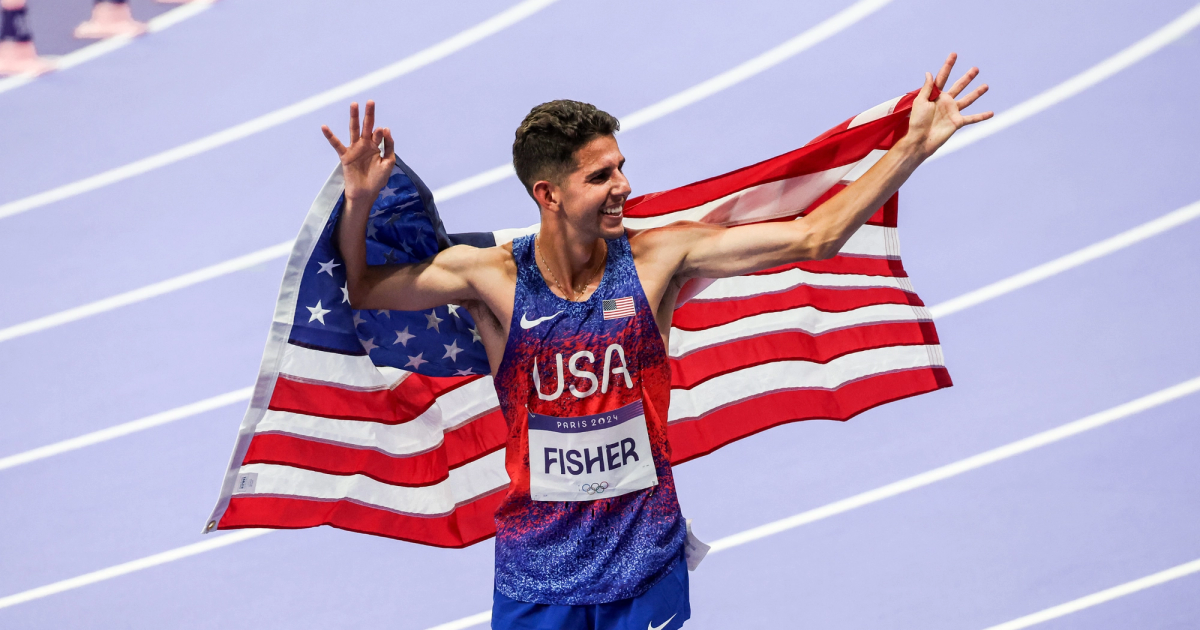
Kevin Morris / @kevmofoto
Your coach told the story already about how, when you shared your goals with him for the year. You said: ‘An Olympic medal,’ but it was plural. That took him by surprise. Where did the confidence for that come from for you to set multiple medals as your goal?
That's a good point. When you have zero medals, your first goal should be to get one medal, not two. But the Olympics only come every four years. This was a very prime Olympics for my age and my event group. I wanted to give myself two opportunities to do something great. I thought that if I optimized everything around myself, I could get on that podium twice.
I’ve done the double before in previous championships. I had never been on the podium before, but I’ve done pretty well. In Tokyo, I was fifth. In Eugene, I was fourth. In Budapest, I was hurt, so I didn’t make the team. So I was hoping I was running somewhat of a linear progression to get onto the podium. And yeah, I came away with two bronzes. Hopefully, that semi-linear progression continues, and I can be back on the podium next year.
So does that make it tough to start thinking toward next year about what your goals will look like? Or is it just, ‘Alright, there are only two places to improve upon, and gold is still the goal.’
It’s actually quite simple. I’ve had the taste of medals before, and I want some different colors now. It’s as simple as that. I know what I did this year works. I know the training system, the peaking schedule, and the taper schedule all worked well. There are some small adjustments we can make that, hopefully, make the difference between bronze and silver or silver and gold.
But we’ll have to wait 11 months to see if those really pay off. In the meantime, we’ve got some Grand Slam Track stuff going on. That’ll be fun and will definitely dominate the structure of my season. But as far as goals go, I knew immediately by the end of the 2024 season what the goal for 2025 was: get even higher on the podium.
Let's talk a little bit about the decision to sign with Grand Slam. What compelled you, as you were learning about the ins and outs of the league, to put pen to paper and say, ‘Alright, I'm in for all of it.’
I think the league itself is something that athletes, as well as coaches, fans, and sponsors, have been asking for, and that's just consistency. Track is an incredible sport. I saw firsthand at the Olympics how many people tuned in, both in person and remotely. The number of people who have told me, ‘Hey, I've never watched a track race before, but I watched that 10K, and it had me on the edge of my seat.’
You don’t get that with a Diamond League race or a domestic or Continental Cup race. But when there’s intrigue and a reason to watch, people watch. One of the great things about the Olympics is everyone knows when they’re happening and that the best people in the world will be there. Hopefully, Grand Slam becomes something like that, where you can reliably buy a ticket for a race in December and know the best people are going to be there, competing.
It’s not like some other races in track, where the fields shift a lot up until the week before. As an athlete, it’s great to sign onto something where I know what my schedule is. A lot of times, you go into a season and don’t even know next month’s racing schedule. This is fantastic exposure for athletes. I want to race the best people in the world. I like having a consistent, predictable schedule, and it’ll be fun.
Also, if you’re an athlete who only cares about maximizing your financial situation, this would still be the correct decision. Throw away all the other reasons to do this – the funding behind this is great. If you want to incentivize athletes to do something, money talks. I think this is going to be really fun. Being part of the inaugural year is going to be a blast. I’m sure there’ll be things learned by everyone this year that will be implemented in future years. But being part of the first one is going to be special. I’m excited.
One of the most interesting things I’ve picked up on, just from talking to racers, has been the fact that someone like Luis is looking at sharpening his tactics for a championship. He’ll be able to face some of the top guys he’ll see at the World Championships, and he doesn’t get that being a Guatemalan athlete since there’s no national championship.
Do you feel like you come into Grand Slam with a bit of an edge over some of the other challengers? Because you do have to put up with the U.S. Championships every year, which is almost a model of what these slams could be like.
Exactly. I think more championship racing experience is good. The most compelling races for me as an athlete, and for fans as well, are pure races. Sometimes, when things are really strung out from the gun and it becomes a time trial, the result can be predicted halfway through. You already know what’s going to happen.
But in an unstructured race—like the Olympic final, the U.S. Championships, or Grand Slam—there’s a lot more intrigue and excitement. If those are the most important races in our sport, which they are, you need to practice that and you need to practice against really good people. Every one of these races is going to be a great opportunity for that. People are going to hone their tactics as they go.
I’ve never doubled a 5K and a 3K over the span of three days before, and I don’t think anyone else in the field has either. People will be learning how to gauge their effort in the first race, recover, and be ready for the second one. It’s going to be really interesting.
Luis has been fourth at global championships twice now. He’s knocking on the door of a medal. I have some medals now, and Ronald has some medals. We’ll see who the fourth racer will be, and then there will be challengers who will be hungry and ready to go. It’s going to be championship racing, which is what matters in our sport and what is most entertaining. So it’s a win-win.
By the time this probably comes out, I think the locations will be public for people. I think the added intrigue here is Jamaica—a 3K and 5K in Jamaica, in the heat. That could also get pretty fun, at least for the spectators. But in the moment, it might not be as fun for the racers.
It'll be really exciting. I live in Park City, Utah, and I don’t know when this will be released, but it’s October right now. Cross country skiers come up to Park City to train a lot right before their season starts, and that time is right now. They all go roller skiing.
There’s a roller skiing race just outside of Park City that I went to. It’s an up-and-down course on almost like a bike path surface. If you don’t know what a roller ski is, it’s like a short ski with rollerblade wheels in line underneath.
There was this race with Olympic medalists, global medalists, some of the best cross country skiers in the world. I went to watch, and it was awesome. No one cared about time—the racers didn’t care, the spectators didn’t care. It was all about the race. Every single one came down to the last 100 meters, maybe 50 meters, just an all-out dash for the finish. It was exciting.
I think sometimes we overcomplicate track a little bit for the general audience and get away from what people love about it: head-to-head racing. It’s why people race in the schoolyard. It’s why people want to do their elementary school 100-yard dash. No one cares about the time—it’s about competition and those storylines.
If you never PR’d again, how do you feel about this being your PR? Are you not stressing about times as much anymore for this upcoming chapter of your career?
I’d be pretty happy with it. If someone were to break one of my American records, I think I’d want that back. So I’d probably try to set something up to attack that record again. But racing is super fun, and time trialing is fun, too.
The track is a very unique sport. It’s one of the few endurance sports where everything is very standardized. Swimming might be the only comparable one. The track is 400 meters wherever you go. As long as you’re roughly at sea level, your times are going to be roughly the same. You can debate about super shoes, but you can still compare across years and generations and yourself from last year or two years ago.
There's always the temptation to want to go faster.
Yeah. What is my limit time-wise, and how does that compare to every American that's ever existed? But it's really fun also just to be like, "Am I the best guy in the world?" Today, but maybe I’m not the best guy in the world tomorrow. But today, at this race, am I in the top three in the world? In the top two? If you can get all of the best people in the world in that location, you can find out. And that’s really fun, too.
Listen to the full interview with Grant here.
___________________
Keep up with all things track and field by following us across Instagram, X, Bluesky, Threads, and YouTube. Catch the latest episodes of the CITIUS MAG Podcast on Spotify and Apple Podcasts. For more, subscribe to The Lap Count and CITIUS MAG Newsletter for the top running news delivered straight to your inbox.

Chris Chavez
Chris Chavez launched CITIUS MAG in 2016 as a passion project while working full-time for Sports Illustrated. He covered the 2016 Olympics in Rio de Janeiro and grew his humble blog into a multi-pronged media company. He completed all six World Marathon Majors and on Feb. 15th, 2025 finally broke five minutes for the mile.

